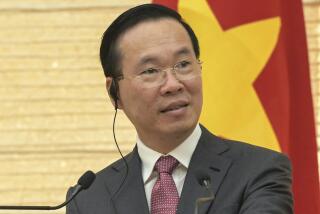Taiwanese President Curtails His Power
- Share via
BEIJING — Dogged by scandal and declining popularity, Taiwanese President Chen Shui-bian announced late Wednesday that he would hand over significant government and ruling-party authority to his premier.
In a written statement, Chen said all decisions related to Taiwan’s Cabinet and the ruling Democratic Progressive Party, including political campaigns, would henceforth be handled by Premier Su Tseng-chang.
Chen has been fighting a rear-guard action amid growing party and family scandals. Police recently arrested his son-in-law Chao Chien-min on insider-trading allegations involving shares of partially state-owned property company Taiwan Development Corp. And opposition politicians accused Chen’s wife, Wu Shu-chen, of accepting free vouchers from an upscale Taipei department store.
Chen and his family members promised to “conduct themselves according to the highest ethical standards and live up to the public’s expectations,” state-funded China News Agency said.
Some analysts question whether Chen’s political retreat is real or tactical. The mercurial president, a lawyer by training, is known for maneuvers that yield short-term political benefits but fall short of statesmanship.
“I think we should give President Chen the benefit of the doubt on this latest move,” said George Tsai, a professor at National Chengchi University. “Still, he has a history of saying one thing and doing another. It can be a bit hard to trust him.”
Chen, whose term expires in 2008, was already seen as a lame duck before the latest scandals. Analysts said Chen’s retreat appears aimed at avoiding a worse fate, namely losing his job. The legislature could ask voters to remove Chen, and there have been calls for his resignation.
Once his position is shored up, some say, he may try to exploit the vague line between presidential and premier power under Taiwan’s Constitution, hoping to regain political momentum. Externally, he could look for greater support among voters who credit him with accepting responsibility for the scandals. Internally, he could appeal for backing from Su’s loyalists and pro-independence factions within the ruling DPP.
A key indicator will be how much authority he cedes over relations with mainland China, foreign policy and military affairs, all key presidential powers, analysts said.
But Chen’s maneuvering room is shrinking.
“There’s a Chinese expression: ‘When the tree is falling, everyone starts pushing,’ ” Tsai said. “And the monkeys are now jumping out of the tree.”
More to Read
Sign up for Essential California
The most important California stories and recommendations in your inbox every morning.
You may occasionally receive promotional content from the Los Angeles Times.













